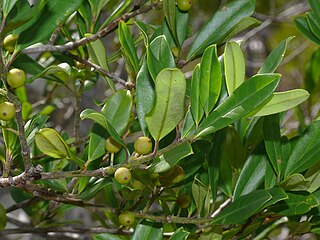
Quercus ilex, the evergreen oak, holly oak or holm oak is a large evergreen oak native to the Mediterranean region. It is a member of the Ilex section of the genus, with acorns that mature in a single summer.

Ilex opaca, the American holly, is a species of holly, native to the eastern and south-central United States, from coastal Massachusetts south to central Florida, and west to southeastern Missouri and eastern Texas.

Ilex cassine is a holly native to the southeastern coast of North America, in the United States from Virginia to southeast Texas, in Mexico in Veracruz, and in the Caribbean on the Bahamas, Cuba, and Puerto Rico. It is commonly known as dahoon holly or cassena, the latter derived from the Timucua name for I. vomitoria.

Ilex vomitoria, commonly known as yaupon or yaupon holly, is a species of holly that is native to southeastern North America. The word yaupon was derived from the Catawban yą́pą, from yą- tree + pą leaf. Another common name, cassina, was borrowed from Timucua. The Latin name comes from an observation by early Europeans that the ingestion of the plant was followed by vomiting in certain ceremonies.

Ilex verticillata, the winterberry, is a species of holly native to eastern North America in the United States and southeast Canada, from Newfoundland west to Ontario and Minnesota, and south to Alabama.

Black drink is a name for several kinds of ritual beverages brewed by Native Americans in the Southeastern United States. Traditional ceremonial people of the Yuchi, Caddo, Chickasaw, Cherokee, Choctaw, Muscogee and some other Indigenous peoples of the Southeastern Woodlands use the black drink in purification ceremonies. It was occasionally known as white drink because of the association of the color white with peace leaders in some Native cultures in the Southeast.

Ilex crenata, the Japanese holly or box-leaved holly is a species of flowering plant in the family Aquifoliaceae, native to eastern China, Japan, Korea, Taiwan, and Sakhalin.

Ilex aquifolium, the holly, common holly, English holly, European holly, or occasionally Christmas holly, is a species of flowering plant in the family Aquifoliaceae, native to western and southern Europe, northwest Africa, and southwest Asia. It is regarded as the type species of the genus Ilex, which by association is also called "holly". It is an evergreen tree or shrub found, for example, in shady areas of forests of oak and in beech hedges. In the British Isles it is one of very few native hardwood evergreen trees. It has a great capacity to adapt to different conditions and is a pioneer species that repopulates the margins of forests or clearcuts.

Ilex mucronata, the mountain holly or catberry, is a species of holly native to eastern North America, from Newfoundland west to Minnesota, and south to Maryland and West Virginia.

Ilex guayusa is a species of tree of the holly genus, native to the Amazon Rainforest. One of four known caffeinated holly trees, the leaves of the guayusa tree are harvested fresh and brewed like a tea for their stimulative effects.

Kuding or kuzding is a particularly bitter-tasting Chinese infusion, which due to their similarities in appearance is derived from several plant species. The two most common plants used to make kuding are the wax tree species Ligustrum robustum and the holly species Ilex kaushue, the former being more commonly grown in Sichuan and Japan while the latter is most commonly grown and used in the rest of China. Tea produced from Ligustrum or many species of Ilex is caffeine-free, although not Ilex paraguariensis, the source of mate drank in South America.

Ilex integra, the elegance female holly, also called mochi tree, is an ornamental tree of the holly genus, which is native to parts of Asia, including Korea; Taiwan; the mid-southern regions of China; and Honshu, Shikoku and Kyushu in Japan. Its flower is light yellow. The species was botanically described in 1784.

Ilex decidua is a species of holly native to the United States.

Perny's long-nosed squirrel is a species of rodent in the family Sciuridae. It is found in Northeast India, southern and central China, northern Myanmar, northern Vietnam, and Taiwan.

Ilex latifolia is a species of holly, native to southern Japan and eastern and southern China, growing in broadleaf forests at altitudes of 200–1,500 m.

Ilex amelanchier, the swamp holly or sarvis holly, is a rare species of holly from the southeastern United States. It is a close relative of mountain holly which used to be placed in a monotypic genus Nemopanthus. Ilex amelanchier grows near water, for example on streambanks.

Ilex, or holly, is a genus of over 570 species of flowering plants in the family Aquifoliaceae, and the only living genus in that family. Ilex has the most species of any woody dioecious angiosperm genus. The species are evergreen or deciduous trees, shrubs, and climbers from tropics to temperate zones worldwide. The type species is Ilex aquifolium, the common European holly used in Christmas decorations and cards.

Ilex mitis is a tall, dense, evergreen tree that is indigenous to Sub-Saharan Africa and Madagascar. It makes an excellent fast-growing hedge for gardens - growing tall, straight and dense.

Antheraea pernyi, the Chinese (oak) tussar moth, Chinese tasar moth or temperate tussar moth, is a large moth in the family Saturniidae. The species was first described by Félix Édouard Guérin-Méneville in 1855. Antheraea roylei is an extremely close relative, and the present species might actually have evolved from ancestral A. roylei by chromosome rearrangement.

Ilex ambigua is a species of flowering plant in the holly family known by the common names Carolina holly and sand holly. It is native to the southeastern and south-central United States, along the coastal plain from North Carolina to Texas, inland as far as Oklahoma, Arkansas, and Tennessee.




















